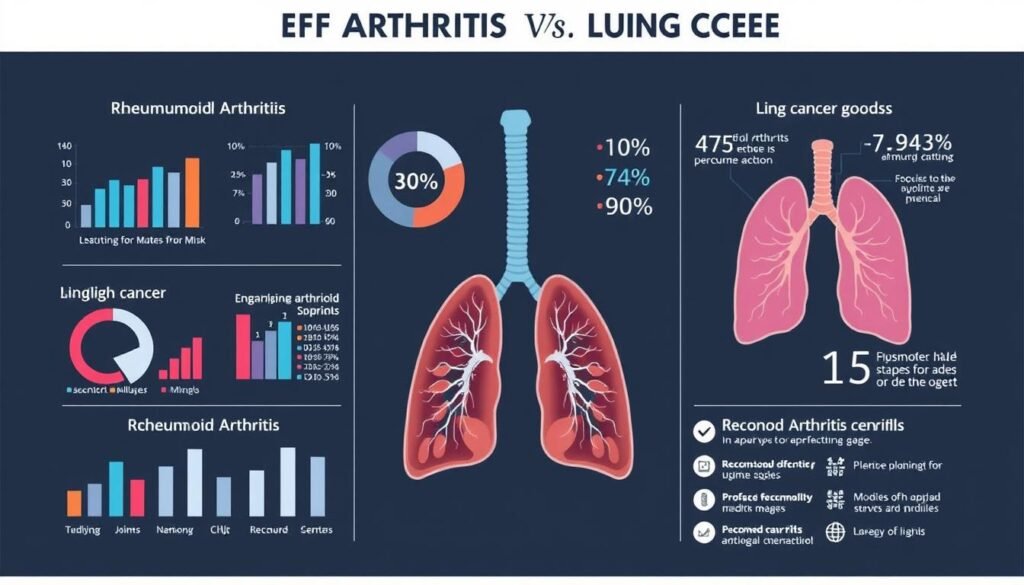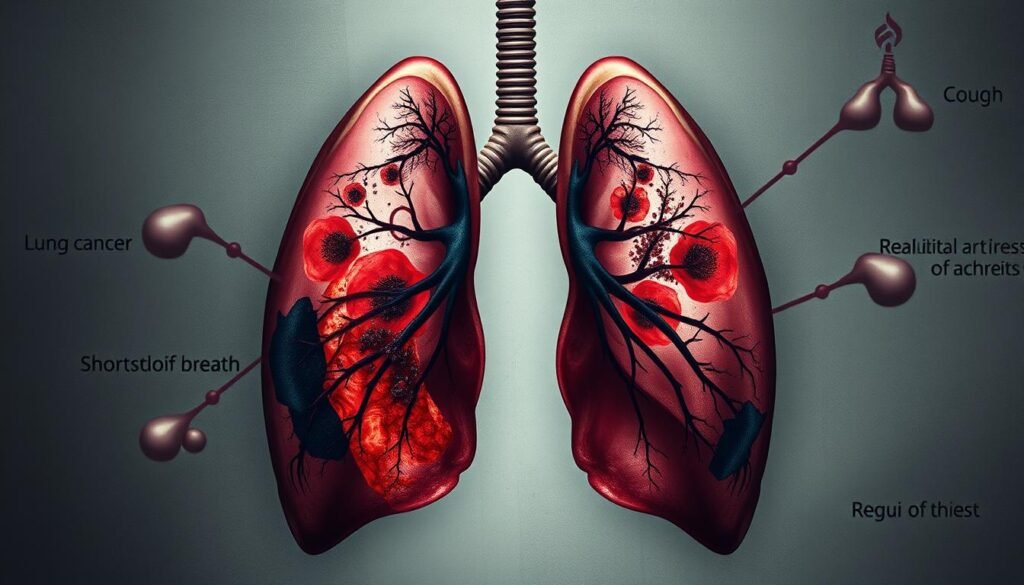About 40 in every 100,000 people are diagnosed with rheumatoid arthritis (RA) yearly. This disease mainly affects women, hitting them three to four times more than men. RA causes joint pain and inflammation, but it also increases lung cancer risk.
The connection between RA and lung health is vital. Studies show a high rate of lung cancer in RA patients. This makes it important to know the risks early. Patients need to understand these risks for better health management.
Key Takeaways
- The annual incidence of rheumatoid arthritis is around 40 cases per 100,000 individuals.
- Women are disproportionately affected by rheumatoid arthritis, with a rate of 3-4 times higher than men.
- Smoking significantly increases the risk of both rheumatoid arthritis and lung cancer.
- Patients with rheumatoid arthritis have nearly twice the risk of developing lung cancer compared to the general population.
- Understanding extra-articular complications of RA, including lung cancer, is vital for effective patient care.
- Early diagnosis and treatment options can significantly improve outcomes for RA patients facing lung malignancies.
Understanding Rheumatoid Arthritis
Rheumatoid arthritis (RA) is a long-term autoimmune disease focusing on the joints. It causes intense joint inflammation. This leads to pain, swelling, and stiffness that make moving hard. The disease also brings joint deformities and constant tiredness, often in women.
Definition of Rheumatoid Arthritis
Rheumatoid arthritis means the body’s immune system attacks its tissues by mistake. This can cause chronic inflammation and joint damage. Catching the disease early is key to control it and lessen problems.
Symptoms and Impact on Joint Health
RA causes severe joint inflammation, affecting daily life. Sufferers feel extreme pain and have trouble moving. It can greatly limit one’s life and cause emotional upset. People with RA also face more health issues, impacting overall health. For more info, visit the Mayo Clinic.
Connection Between Arthritis and Lung Health
Rheumatoid arthritis (RA) affects more than just joints. It also impacts lung health. People with RA have a higher risk of lung problems like pulmonary nodules and interstitial lung disease (ILD).
Extra-articular Manifestations of Rheumatoid Arthritis
RA can harm organs beyond the joints, including the lungs. The chronic inflammation from RA affects lung health seriously. Studies show RA patients can develop serious lung diseases. This makes lung health checks vital.
Lung Complications in Patients with RA
RA and lung complications are closely linked. Patients may have pulmonary nodules, small growths showing lung issues from inflammation. Diseases like interstitial lung disease can lead to worsening lung function. Research indicates that lung problems are more common in RA patients than in those without RA.
The following table shows lung health complications in people with rheumatoid arthritis:
| Health Concern | Incidence Rate (per 10,000 patient-years) | Adjusted Hazard Ratio (aHR) |
|---|---|---|
| Lung Cancer in RA Patients | 58.4 | 1.58 |
| Lung Cancer in RA-ILD Patients | 109.3 | 3.25 |
| Non-RA Patients | 35.6 | N/A |
| Lung Cancer Mortality in RA Patients | N/A | 1.58 |
It’s vital to regularly screen RA patients for lung issues. Early detection of problems like pulmonary nodules and ILD can lead to better care. Being aware of these risks helps improve patient outcomes.
Rheumatoid Arthritis Lung Cancer: Overlapping Risks
The link between rheumatoid arthritis (RA) and lung cancer is concerning for doctors. Studies show high lung cancer rates in RA patients. It’s crucial for both affected people and their doctors to understand these findings.
Incidence Rates of Lung Cancer in RA Patients
RA patients have a higher chance of getting lung cancer. Their rate is 56 per 100,000, unlike 33 per 100,000 in others. This shows their risk is significantly higher. Even after removing smoking from the equation, their lung cancer risk is still 1.77 times greater than others.
Factors Contributing to Increased Risk
Smoking and RA raise lung cancer risk dramatically. Smokers with RA are almost seven times more likely to get lung cancer than non-smokers without RA. RA-related antibodies also make lung cancer more likely, increasing the risk by two to six times, even for non-smokers.
The risk of lung cancer in RA patients grows over time. Twenty years after diagnosis, their risk is about 3%. Smokers with RA antibodies face over a 4% risk. Studies confirm RA patients have a 10% higher chance of cancer overall.

Role of Smoking in Lung Cancer Risk
Smoking has a big role in raising the risks of both rheumatoid arthritis and lung cancer. This relationship between smoking and these health issues is very important. This is because lung cancer rates are high in people with rheumatoid arthritis. Knowing how smoking affects them can help patients and doctors find ways to prevent these diseases.
How Tobacco Use Affects RA and Lung Health
Smoking makes rheumatoid arthritis symptoms worse and harms the lungs too. Research shows several important points:
- Smoking leads to chronic obstructive pulmonary disease (COPD), a leading cause of death in the U.S.
- Long-term smokers often get chronic bronchitis, causing inflammation in the airways and a long-lasting cough.
- Emphysema is also common in smokers, making it hard to breathe, even when resting.
For those with rheumatoid arthritis, smoking’s effects are even worse, raising their health risks significantly.
Statistics on Smoking and Lung Cancer Incidence
The numbers on lung cancer in smokers, especially those with rheumatoid arthritis, are alarming:
- RA patients are 1.5 to 3.5 times more likely to get lung cancer than the general population.
- Most lung cancer cases in RA patients show up within five years of diagnosis.
- For current smokers with RA, the risk of lung cancer is nearly nine times higher than for those who never smoked.
About 44,101 RA patients were studied, and 590 cases of lung cancer were found. That’s a rate of 56 per 100,000. This is much higher than the 33 per 100,000 rate in the general population. After 20 years, the risk of lung cancer for smokers with rheumatoid arthritis tops 4%. This shows why it’s crucial to have smoking cessation programs for those with rheumatoid arthritis. These programs can lower the risks related to smoking.

Symptoms of Lung Cancer in Patients with Rheumatoid Arthritis
It’s hard to spot lung cancer signs if you have rheumatoid arthritis. Symptoms from both conditions overlap, especially related to breathing. Spotting these signs early is key to managing and treating them well.
Recognizing respiratory symptoms
Look out for these important signs of lung cancer:
- Persistent cough that doesn’t get better with time.
- Dyspnea, or finding it hard to breathe, especially during activities.
- Chest pain that gets sharper with deep breaths or coughs.
- Unexplained weight loss and feeling very tired, common in both conditions.
Distinguishing between RA-related Symptoms and Lung Cancer Symptoms
Telling RA and lung cancer signs apart can be tough. Lung cancer might cause chest pain similar to RA nodules. Pay attention to any new or worsening symptoms, and talk to your doctor about them. Staying alert and having regular check-ups could save your life.

Diagnosis of Lung Cancer in RA Patients
Finding lung cancer in those with rheumatoid arthritis (RA) is hard because symptoms often overlap. Doctors use many tools to diagnose lung cancer correctly. These tools are vital to help with treatment early on, especially since RA raises the cancer risk.
Diagnostic Tools Used in Identifying Lung Cancer
Doctors use various diagnostic tools to spot lung cancer in RA patients. These include:
- Chest X-rays: These help see the lungs and can show if there’s something wrong.
- CT Scans: CT scans give detailed pictures, making it easier to spot lung issues and tumors.
- Lung Biopsies: To be sure it’s cancer, doctors might need to take a small piece of lung tissue and test it.
The Importance of Early Detection
Early detection of lung cancer makes a big difference in treatment, especially for RA patients. They’re more likely to get lung cancer, with studies showing a 1.64 times higher chance than others. That’s why it’s vital to keep a close watch and get regular check-ups, especially if breathing problems or coughs show up.
Using screening methods for a lung issue called interstitial lung disease (ILD) might help catch cancer early in RA patients. Steps include regular check-ups and watching for symptoms like coughing or hard breathing.
There aren’t rules yet for yearly lung cancer scans for RA patients, but doctors often use chest X-rays to check on them. More studies may help find better ways to spot lung cancer early in RA patients.
| Diagnostic Tool | Purpose | Advantages |
|---|---|---|
| Chest X-ray | Initial screening for abnormalities | Quick and accessible |
| CT Scan | Detailed imaging of lung structures | Higher sensitivity to detect small tumors |
| Lung Biopsy | Definitive diagnosis | Accurate tissue diagnosis |
Treatment Options for Rheumatoid Arthritis Lung Cancer
People with rheumatoid arthritis and lung cancer have unique hurdles in their treatment path. They have a mix of standard and new treatments to target both conditions at once.
Conventional Treatment Approaches
Standard methods are key when treating lung cancer in those also fighting rheumatoid arthritis. These include:
- Chemotherapy: Uses drugs to kill or stop cancer cells.
- Surgery: Surgically removes the tumor when possible.
- Radiation therapy: High-energy rays are used to destroy cancer cells, ease symptoms, and control the tumor.
Doctors need to watch how these treatments affect rheumatoid arthritis drugs and the patient’s overall health. Finding the right treatment depends on the patient’s specific needs and how severe their condition is. Learn more about tailored treatment options
Targeted Therapy and its Benefits
Targeted therapy has changed the game in cancer treatment. It uses drugs to target cancer cells closely, sparing healthy ones. The perks of targeted therapy include:
- Precision: It zeroes in on cancer’s unique traits for better results.
- Less toxicity: Fewer side effects than traditional treatments.
- Potential for immunotherapy: It might boost the immune system’s ability to fight cancer, offering hope to those with rheumatoid arthritis.
Things are changing in how we treat these conditions. A team approach makes sure that treatment for both rheumatoid arthritis and lung cancer is strong, improving life and care for patients.
Preventative Measures for Patients with RA
For those with rheumatoid arthritis (RA), being proactive can greatly lower lung cancer risks. It’s key to take regular steps for good health. This includes monitoring your health and making lifestyle changes.
Importance of Regular Monitoring and Screening
Patients with RA should monitor their health closely. This helps spot lung issues early. Regular check-ups with doctors are important. They give patients insights to manage their health better.
By staying informed, patients can act quickly if problems arise. This can change the outcome for the better.
Lifestyle Changes to Mitigate Risks
Making lifestyle changes is crucial for RA patients to lower lung cancer risk. Not smoking is one of the most important steps. Quitting smoking helps reduce RA risk.
Eating foods high in omega-3s, like fish, helps. Adding fruits and veggies to your diet supports your lungs. Keeping a healthy weight and exercising regularly matters too.
Avoiding harmful inhaled substances is also important. Having good oral health and enough vitamin D helps your health overall.
Together, lifestyle changes and regular healthcare build a strong defense against lung cancer in RA patients. For more on health risks related to allergies and lung cancer, click here.
| Lifestyle Changes | Benefits |
|---|---|
| Smoking Cessation | Reduces RA and lung cancer risk |
| Diet Rich in Omega-3 | Protects against inflammation |
| Regular Exercise | Supports joint health and immunity |
| Good Oral Hygiene | Lowers the risk of periodontal disease |
| Vitamin D Management | Enhances immune system functionality |
Conclusion
Rheumatoid arthritis and lung cancer are closely linked, posing big challenges for patients. Studies show that people with rheumatoid arthritis have over a 50% higher chance of getting lung cancer. This risk triples for those with RA-related lung disease. It’s vital for patients and doctors to be aware of these risks.
To face this issue, it’s key to watch patients closely and spot problems early. Smokers with RA are in even more danger. They need special plans, like help to quit smoking. Early screenings and teaching patients can lead to better health outcomes.
Working together, patients and doctors can fight the risk of lung cancer in those with rheumatoid arthritis. Focusing on early detection and prevention can help manage the risks. Check out this study for more on RA and lung cancer risks: Increased Lung Cancer Risk in RA.